 Rebekah Wing
Rebekah Wing Lauren Peacher
Lauren Peacher Manuella Lupascu
Manuella Lupascu Lina S
Lina S Millie V R
Millie V R
China will release 400,000 tonnes of cotton from state reserves, on top of 600,000 tonnes released last month, to meet textile needs and to counter rising domestic prices, the China Cotton Association said.
The association, in a statement posted on its web site (www.china-cotton.org), did not give more details.
The sales came as the domestic harvest was delayed by about 10 days to late September or October. Domestic cotton prices have risen to a record high due to tight supplies and a recovery of textile production.
Demand for cotton in China, the world's largest buyer and grower, outstripped domestic production by 3.6 million metric tons in 2009-2010, widening a supply deficit, the China Cotton Association said today.
The gap increased by 2.6 million tons from the previous year, the group said, citing Zhang Xiaoqiang, deputy head of the National Development and Reform Commission.
"A recovery in the textile industry coupled with a drop in production because of lower income from cotton planting has resulted in a relatively big change in the demand and supply balance", the association said, citing Zhang in a government meeting on cotton.
China's domestic cotton production fell by 14.7 percent to 6.4 million tons in the year ended Aug. 31, Zhang was quoted as saying. Yarn production expanded by 16.6 percent in the same period to 26.41 million tons, driving a total demand for cotton to 10.6 million tons, he added.
China has sold the natural fiber from government stockpiles in auctions to bridge the supply gap, offloading 1.1 million tons during September and December and another 230,000 tons between Aug. 10-31, Zhang said. The country's cotton imports jumped 73 percent from a year ago to 2.51 million tons.
Standard cotton prices in China have climbed 29.3 percent in 2009-2010 to an average 15,724 yuan ($2,347) a ton, pacing the gain in the international cotton market, the report said.
More Sales
China will auction a further 300,000 tons to 400,000 tons of cotton from state reserves to satisfy demand from the textile industry, industry researcher cncotton.com said yesterday in a report.
The country will release the additional cotton following a decision to sell 600,000 tons starting Aug. 10, the report said.
Cotton in Zhengzhou reached a record of 22,000 yuan a ton today as supplies tightened on increased demand for yarn and reduced output. Prices have climbed 28 percent since the government started auctioning state reserves on Aug. 10.
Hotel managers now have a staff uniform service to match their 24-7 working lifestyle with the launch of a web ordering and tracking service from leading UK corporate clothing company Incorporatewear Ltd.
Premier Inn’s 15,000 UK receptionists, managers, housekeeping and restaurant staff are one of the first of Incorporatewear’s clients to benefit from the new system.
Incorporatewear won the contract to supply staff uniforms to Premier Inn in the UK earlier this year, and has since fine-tuned its online ordering system with input from the hotel chain’s managers. The service – one of the first of its kind in the corporate clothing sector - is now ready to roll out to customers in other industries, including airline, leisure and retail.
“Feedback from Premier Inn hotel managers has been 100 per cent positive,” enthused Rob Pollock, Managing Director of Incorporatewear. “In a business that operates 24-7, 365 days a year, we are giving customers hands on control of ordering uniformed clothing whenever they want. They’re not tied to our helpline opening hours, and they don’t have to generate paperwork or send us faxes.”
Incorporatewear is providing the web ordering service to ensure greater data accuracy and provide clients with stock and order visibility through its supply chain. The company expects that, over the next 12-18 months, the majority of orders will be placed online. Users will be still able to use the telephone hotline or fax ordering, if they prefer, but the web service is faster and more secure, giving direct access to Incorporatewear’s commercial systems.
Orders are instantly transmitted to the clothing company’s warehouse for picking and packing. The progress of deliveries by courier DHL is also available to view online so managers can see at the touch of a button when to expect new staff clothing, and, of course, the system is paperless.
To complement this facility, Incorporatewear recently launched an iPhone app to allow users to track orders and get useful garment information, such as the best way to care for uniforms.
Incorporatewear reports that Premier Inn managers particularly appreciate being able to view images of staff clothing online when placing orders.
Meanwhile, the hotelier’s management have full visibility of uniform stock levels held by Incorporatewear.
The clothing company sources and supplies three styles of uniforms to Premier Inn – suits and shirts or blouses for reception/management personnel; trousers, aprons and shirts for restaurant staff; and polo shirts, combat trousers and fleeces for housekeeping staff.
Incorporatewear, based in Coleshill, West Midlands, last year had an £11 million turnover but is growing fast on the back of its exceptional service offering. Co-founded by celebrity designer Jeff Banks and others, it has a reputation as a leader in the corporate clothing sector. Customers include Virgin Atlantic Airways, Nationwide, Matalan and London Midland Trains.
Premier Inn is the UK and Ireland's biggest and fastest growing hotel company with over 590 budget hotels offering quality accommodation at cheap hotel prices.
Ends
The textile sector is alarmed by the sharp increase in its power tariff, which rose to Rs 7.15 per kwh in January, 2010 from Rs 3.70 per kwh in August 2006 an increase of more than 100 percent over a period of four years.
According to a spokesperson from the textile industry, the power tariff is equal to 30 percent of the conversion outlay of textile spinning and organized weaving sector. Due to the rising electricity costs, continuation of factory operations has become difficult.
The export-driven textile sector is currently facing tough competition from the other regional contenders in the global market. The textile producers in other competing countries are exempted from several restrictions. Electricity per kilowatt as expressed in terms of US cents is much lower in other Asian countries, like it costs 8.14 cents in India, 8.5 cents in China and 5.23 cents in Bangladesh as compared to 9.41 cents in Pakistan.
The industry in the country is facing, for the first-time, scarcity of raw materials, exorbitant financial expenditure and aggressive approach of the western countries towards Pakistan. The government should, therefore, reassess the industry??s increasing burden of power tariff. It is only the textile sector, which can restore the economy that has been badly affected by damage caused by the recent floods.
The President as well as the Prime Minister should get involved in the matter and instruct the concerned officials to offer reasonable tariff for B/3 & B/4 industrial connections for the sake of the textile industry and textile exports, according to the spokesperson.
H&M hopes that the Harborplace location it plans to open in March will help boost customer traffic at the waterfront pavilions in downtown Baltimore by bringing an in-demand and fast-growing apparel brand to the city, executives of the Swedish retailer said Thursday.
H&M, a chain of men's, women's and children's apparel that is opening hundreds of new stores this year, plans a 20,000-square-foot, two-level store in the Light Street pavilion that will have its own entrance from the promenade along the harbor, representatives said during a design presentation to the city's Urban Design and Architecture Review Panel. The retailer has performed best at street level locations in cities such as Boston, Philadelphia, Washington D.C. and Chicago and expects similar results in Baltimore.
"It's a destination," said Susan Sernett, a real estate manager for the retailer. "It is very much an in-demand brand, and there is still great excitement when we have come in to each of these (new) locations. We can help drive traffic on a year-round basis."
Models display creations of SERGIO ZAMBON during the Women's fashion week in Milan, Italy, Sept. 28, 2010. The Fashion Week finished on Tuesday.
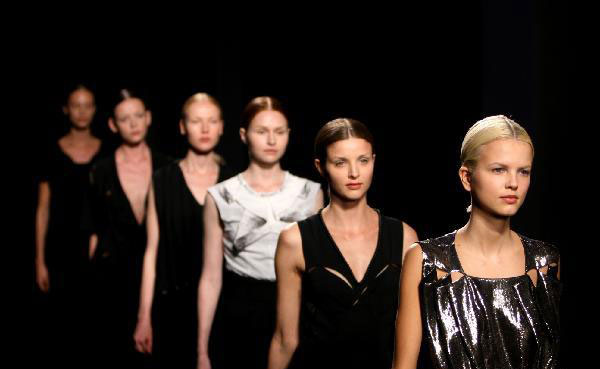
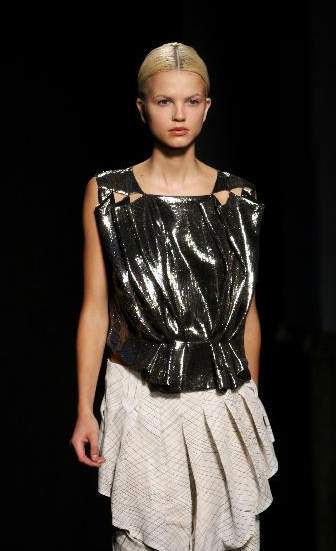
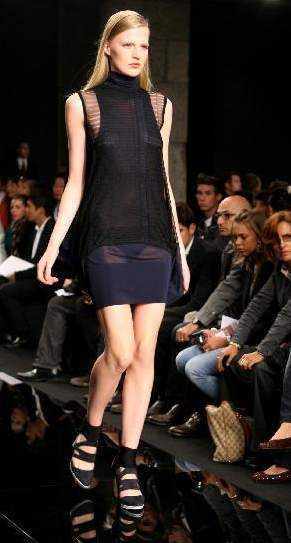
To finish up Milan Fashion Week, Giorgio Armani showed his Spring/Summer 2011 collection and suffice it to say, the designer has the blues. He showed ensemble after ensemble constructed from navy fabrics.
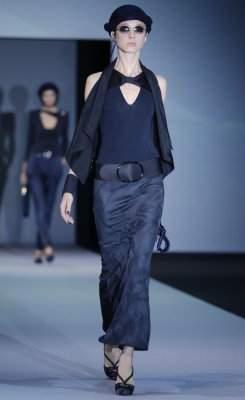
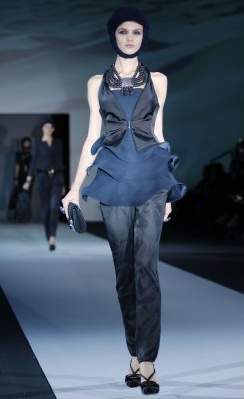
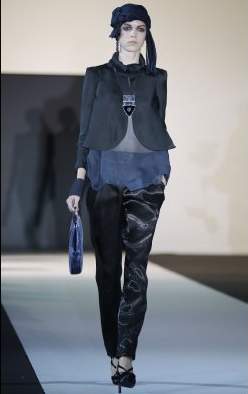
Although the inspection standard for textile is improving in the US and EU markets in recent years, textile and garment manufacturers in Shishi, Fujian are also enhancing the product quality to meet the higher requirement and then increasing their export to those markets.
According to Shishi Customes, the shoes export reached 2221 batches, valued 112.974 million USD from Jan. to Aug., up 26.8% and 39.4% year on year resepctively. The export of textile were 2376 batches, valued 97.739 million USD, up 48.6% and 94.6% respectively. The traditional textile products accounted for 95% of the volume and 83.7% of the value. Of which, the export to the EU were 741 batches, valued 34.021 million USD, up 73.1% and 199.1% respectively. The growth trend kept soaring.
Chinese visitors to the U.K. account for 30 percent of Burberry Group Plcs business in Britain, according to Angela Ahrendts, the luxury retailers chief executive officer, the Financial Times reported.
Stacey Cartwright, the chief financial officer, said such sales are being boosted by the pound's weakness, adding that Burberry goods are 40 percent cheaper in the U.K. than in China, mainly because of taxes and duties, the newspaper reported.
Burberry, having bought out its 50 franchises in China in a 70 million-pound ($110 million) transaction, plans to add another 10 stores there by the end of the year, the FT said.
BASF, the world leading chemical company released its 2009 annual financial report of great China area. According to the report, the company will invest over 2 billion Euros in China from 2009 to 2013. What's more, it will set its Asian research base in Shanghai.
In 2009, China became BASF's third largest market after Germany and U.S. The annual sale in great China area reaches 4.1 billion Euros with the average annual growth of over 20%. Although its global business was influenced by world economy crisis, China market became its growth engine. As a result, it will increase its investment in China. It is learned that BASF has already had many production bases in Shanghai. In 2009, it established its chemistry building materials center and painting technique center in Shanghai.
As a chemical giant, BASF's annual global sales reached 50.7 billion Euros in 2009. Its business covers crude oil, natural gas, chemistry products and plastics and so on.